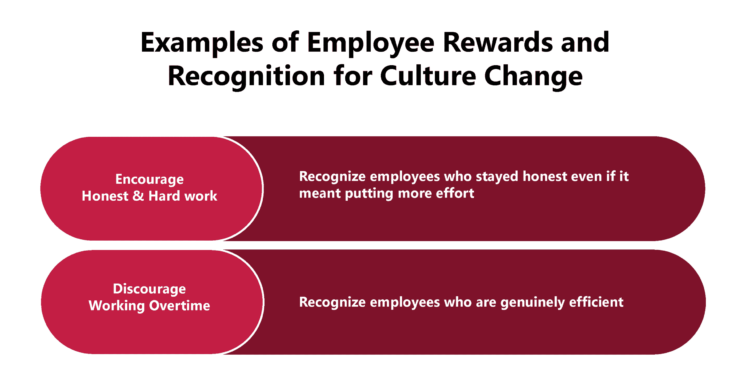1. Employee rewards and recognition can effectively drive culture change by reinforcing desired behaviors, such as honesty, hard work, efficiency, and innovation.
2. Recognizing employees who demonstrate integrity and avoid shortcuts helps build a culture of honesty and transparency.
3. Rewarding efficient employees who complete their tasks on time promotes a culture that discourages unnecessary overtime and values time management.
4. Acknowledging employees who explore new ideas, even if they fail, fosters a culture of innovation and encourages continuous learning and improvement.
Employee rewards and recognition can facilitate driving culture change in the organization. To this end, rewards and recognition should consistently reinforce the desired behaviors.
Employee recognition can be an effective tool to drive cultural changes in an organization. It can help reinforce certain behaviors that the organizations want their employees to display.


Let’s take an example of an organization that wants to create a culture of honesty and hard work,
The organization should formally recognize employees who had the option of not being fully honest in the course of their work by taking the easy way out but decided to stay on the right path.
It meant they had to put in a lot more effort and maybe even faced a slight delay in achieving their goals.
Such examples can help build integrity and transparency within the organization, as employees will be less inclined to take shortcuts to achieve their goals.
Hence, recognizing such employees can go a long way in creating such a culture.

Another example could be an organization that wants to discourage employees from staying in the office late, either because they are inefficient or because they want to impress their superiors.
If the organization recognizes genuinely efficient employees, they consistently complete their work on time and leave the office on time.
While ranking and stacking employees by efficiency can be challenging, the organization can implement a self-nomination process.
Feedback from managers and data from the attendance system can easily validate the nominees’ claims.

An organization looking to build a culture of innovation where employees are keen to explore (failure, if need be) and learn should recognize such actions.
Such recognition motivates employees to try out new ideas and methods.
It results in new product ideas and process improvements.

Yes. Recognition programs can effectively reinforce desired behaviors—like honesty, hard work, efficiency, and innovation—helping shape a culture aligned with organizational values.
When employees are acknowledged for choosing integrity over shortcuts—despite added effort—it promotes transparency and discourages unethical behavior.
Commending employees who complete tasks efficiently and leave on time fosters a culture that values productivity and discourages unnecessary overtime.
Rewarding employees who experiment—even when they fail—signals that exploration and learning are valued, encouraging a more innovative mindset.
Recognizing behavior—not just outcomes—is essential. Value-based recognition ensures the “how” matters as much as the “what,” embedding cultural values into everyday actions.
Empowering colleagues to recognize each other promotes inclusivity, increases engagement, and fosters a culture where values are lived and celebrated across the organization.
When top management participates—like attending award ceremonies—it underscores the importance of values-driven behavior and inspires employees to align with cultural goals.
Injecting playfulness—through creative or entertaining recognition activities—makes cultural reinforcement more engaging and encourages broader participation.
– Align recognition with core values.
– Enable behavior-based and peer-driven acknowledgments
– Involve leadership
– Incorporate fun elements to enhance engagement
When recognition consistently reinforces value-aligned behaviors—across performance and conduct—it cultivates a positive culture, enhances engagement, and supports sustainable business growth.
Our view is that employee rewards and recognition can play apivotal role in initiating a change in the organization’s culture. It is really basic human nature to gravitate towards behaviors ratherthan giving them the maximum benefits.
We recommend that organizations include behavior—or value-based recognition — in their employee programs, in addition to general outcome-based recognition.

Lead author: Sagar Chaudhuri, the Co-Founder and CEO of HiFives. He is an HR Tech Evangelist with over 25 years of corporate and entrepreneurship experience. In the past, Sagar has held leadership roles at companies such as Genpact, Infosys, and ICICI Bank. He has an engineering degree from IIT Kharagpur and an MBA from IIM Lucknow. Connect on LinkedIn
To stay updated on the latest HiFives blogs, follow us on Twitter (@MyHiFives)